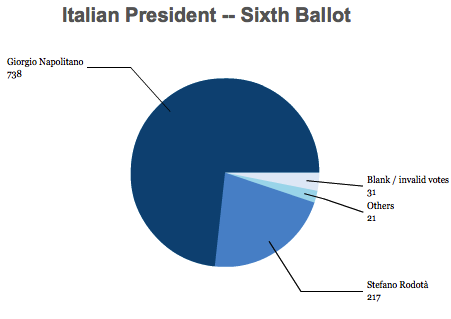So after a humiliating Friday that saw Italy’s centrosinistra (center-left) revolt over the prospect of electing former prime minister Romano Prodi as president, Pier Luigi Bersani, the leader of Italy’s main center-left party, Partito Democratico (PD, Democratic Party), has resigned — effective of the selection of Italy’s new president.![]()
Italy got that president on Saturday on the sixth and final ballot, when the centrosinistra and the centrodestra (center-right) led by Silvio Berlusconi joined together to back the reelection of Giorgio Napolitano, who won handily.
But Napolitano’s reelection — at age 87 — to a new seven-year term isn’t a sign of the political health of the country.
Beppe Grillo, the leader of the Movimento 5 Stelle (M5S, the Five Star Movement), a movement that had supported legal scholar and former leftist parliamentarian Stefano Rodotà since the first ballot termed Napolitano’s election a coup, calling for a large rally in protest later today in Rome.
While Napolitano’s reelection isn’t a coup, it is unprecedented, and Grillo is right to suggest that it represents a victory for the traditional left and the traditional right in Italian politics — in many ways, the sixth ballot represented a return to Bersani’s first-ballot strategy whereby he attempted to join his centrosinistra forces with Berlusconi’s to elect former Senato president Franco Marini with a massive two-thirds majority. When that strategy failed, largely on the revolt of many on the left, including Puglia regional president Nichi Vendola, who leads the minor party in Bersani’s coalition, the Sinistra Ecologia Libertà (SEL, Left Ecology Freedom), and Firenze mayor Matteo Renzi, who challenged Bersani in the centrosinistra primary to determine its candidate for prime minister in the February 2013 elections.
So what comes next?
Most immediately, Napolitano will turn to finding a way out of the political impasse. With Bersani gone from the PD leadership, it seems likelier now that some PD deputies will join with Berlusconi’s Popolo della Libertà (PdL, People of Freedom) to form a short-lived government under, perhaps, another technocratic prime minister. We’ll see over the coming days what Napolitano proposes, who will support it, and what agenda that government might submit.
Although he’s just been reelected, it’s hard to see Napolitano serving much beyond the next parliamentary elections, let alone a full term until he reaches age 94, so I would view the election today as more of a one-year or two-year extension of Napolitano’s term than the promulgation of a head of state for the next seven years. That means, of course, whoever wins the next elections would stand a good chance of electing the next president.
There will be some procedure to determine who replaces Bersani, at least on an interim basis. Without Bersani at the helm, it’s difficult to see any kind of discipline among a group of legislators that runs from former Christian Democrats to democratic socialists. In the longer term, however, Renzi certainly seems the smartest choice to lead what remains of the Italian left following Bersani’s implosion — he’s by far the most popular politician in the country. But it’s not clear that Vendola would accept a Renzi-led left nor is it clear that Renzi would be elected by acclamation, given the potential candidacy of others.
That includes Fabrizio Barca, a rising star who served in prime minister Mario Monti’s cabinet as a minister for territorial cohesion and a former protégé of former Banca d’Italia president and Napolitano’s predecessor, Carlo Azeglio Ciampi. Barca joined the PD last week with a plan to reform both the PD and Italian government.
